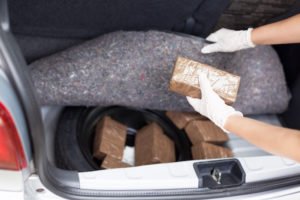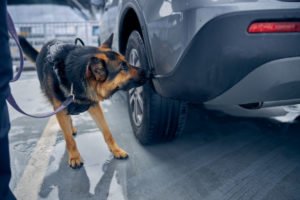
Colorado law does not punish recreational possession of marijuana and psilocybin (“magic mushrooms”) by adults 21 and over.1 However, it is against federal law to cross state lines with these drugs.2
Even driving with marijuana from Colorado to Arizona or to New Mexico is illegal despite that those states permit recreational marijuana as well.3
Therefore, law enforcement officers who see cars with non-Colorado plates leaving Colorado are automatically suspicious: The police may suspect that you may have bought pot or psilocybin in Colorado in order to consume the drugs in your home state.
Currently, there are no formal drug checkpoints on the Colorado border where police search exiting cars for drugs. Though there are other ways police may be able to lawfully stop and search your car.
Can police search my car after a traffic stop?
If you get pulled over for violating a traffic law (such as speeding), officers can legally search your car in either of the following five scenarios:
- The police ask you to search your car and you agree (which you should never do).
- The police already have a search warrant to search your car (which is rare).
- The police have probable cause to suspect there is evidence of criminal activity in your vehicle. An example would be if the police noticed a roach clip in your glove compartment while you were getting your insurance card.
- The police reasonably believe you pose a danger, which justifies the police searching the car in order to protect themselves.
- The police arrest you (such as for DUI or for having an outstanding warrant) and then conduct a “search incident to arrest.” Note that searches incident to an arrest do not include closed containers such as the trunk unless the police have probable cause to believe they contain evidence of a crime.
Though if none of these situations apply to you, then police usually do not have legal grounds to search your car after a minor traffic stop.4
Can police bring a drug-sniffing dog to search my car?
Police may not prolong an ordinary traffic stop just for the purpose for getting a drug-sniffing dog on the scene if there is no evidence that your car contains drugs.
Though if the officer already has a drug-sniffing dog with them during the traffic stop, then it is not a constitutional violation for the dog to sniff your car.5
Can police put up signs for a fake drug checkpoint just to see how drivers react to it?
Yes. In one case, police witnessed a driver dispose of drugs after seeing a sign the police posted that a drug checkpoint lay ahead. The Colorado court held that there was no constitutional violation because the driver was in public and in plain-view when they threw out the drugs from their car.6
What about DUI checkpoints?
Police routinely hold DUI sobriety checkpoints where they may lawfully stop every car going through the checkpoint.
First they ask you questions, such as “Have you been drinking?” If the police see or smell alcohol or drugs – or if you are showing signs of impairment – they may then ask you to
- take a preliminary breath test and
- perform field sobriety tests.
(Both of these tests are optional.)
Then if the police believe there is probable cause that you are committing DUI, they may then arrest you and search your car incident to arrest.7

Police are on high-alert for non-Colorado cars leaving Colorado on the I-25, SR-128, I-76, I-70, and US-287.
Legal References
- CRS 18-18-406. HB21-1090. Andrew Kenney, Coloradans voted to legalize psilocybin. What’s next? CPR News (November 25, 2022).
- 21 U.S.C. 967.
- Same.
- Fourth Amendment. United States v. Ross (1982) 456 U.S. 798.
- Rodriguez v. U.S., (United States Supreme Court, 2015) 575 U.S. 348.
- People v. Roth (Court of Appeals of Colorado, Division Five, 2003) 85 P.3d 571. See also ACLU of Kansas’ “Kansas Two-Step” case against KHP can continue, Tenth Circuit rules, ACLU Kansas (June 6, 2022). Roxana Hegeman, Kansas Highway Patrol targets out-of-state drivers — especially those traveling from Colorado, lawsuit alleges, Denver Post (). Trevor Hughes, Patrolling for pot traffic on Colorado’s fringes, USA Today (March 4, 2014)
- See Michigan Dept. of State Police v. Sitz (1990) 496 US 444 (1990).

